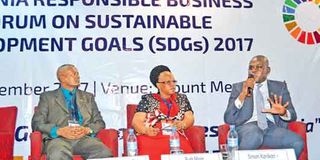Businesses’ role in SDGs emphasized

Tigo Tanzania managing director Simon Karikari speaks during a Sustainable Development Goals forum in Arusha early this week. With him are UNDP’s Fitsum Abraha and National Bureau of Statistics senior official Ruth Minja. PHOTO|THE CITIZEN CORRESPONDENT
What you need to know:
Adopted in September 2015 by 193 UN members, the SGDs contain a set of 17 global goals in the endeavor to end poverty, hunger, improve health and wellbeing and improve education by the year 2030.
Arusha. The United Nations’ (UN) Sustainable Development Goals (SDGs) offer both business opportunities and responsibilities to members of the private sector, a meeting heard here early this week, calling upon businesses to play their roles effectively.
Adopted in September 2015 by 193 UN members, the SGDs contain a set of 17 global goals in the endeavor to end poverty, hunger, improve health and wellbeing and improve education by the year 2030.
They also seek to achieve gender equality; ensure availability of clean water and sanitation; ensure affordable and clean energy; promote decent work and economic growth as well as Build resilient infrastructure, promote inclusive and sustainable industrialization and foster innovation.
With the SDGs, the UN members also pledged to reduce inequalities; promote sustainable cities and communities; ensure sustainable consumption and production patterns; take urgent action to combat climate change and to conserve and sustainably use the oceans, seas and marine resources.
The goals also include protecting, restoring and promoting sustainable use of terrestrial ecosystems, promoting peace, justice and strong institutions as well as strengthening the means of implementation and revitalizing the global partnership for sustainable development.
Speaking on sidelines of a forum on SGD here, the UN resident coordinator in Tanzania, Mr Alvaro Rodriguez, said the private sector is a key player in the implementation of the goals and must play their roles accordingly.
“Implementation of the 17 goals will be easy if the private sector is involved in Tanzania. The sector is a key partner,” he said.
The forum was titled: “Making Global Goals Local Business Tanzania” and went with the theme of: “Better Business Together for the Future Our Economy”.
The private sector, he said, is expected to be play an increasingly important role in the fight against corruption, a vital step towards the building of an inclusive economy.
“Corruption promotes poverty. It deprives people of quality health services. Corruption blocks the delivery of quality services in various sectors including education. If we can reduce corruption, it remains an open secret that the communities will develop,” he said.
Private sector’s role
Companies participating in the forum noted that they have noble roles to play in the realisation of SGDs, with the Tigo managing director, Mr Simon Karikari saying his company has been part of the goals since the mobile industry adopted them (SGDs) in 2016.
Under the sector’s ambrella goal of ‘Connecting Everyone and Everything to a Better Future’, said Mr Karikari, his company has always thrived to ensure that it connects an increasing number of Tanzanians so they can become part of the transformation agenda.
Quoting from estimates by the GSMA – a trade body that represents the interests of mobile network operators worldwide – he said the projections were that by the end of 2016, an estimated 4.7 billion men and women would have subscribed to a mobile phone service. It is also estimated that by 2020, upwards of 5.6 billion people will be connected to a mobile phone service.
“As Tigo Tanzania, we have been the market leader in digital lifestyle transformation since 1995. Currently, we cover 80 per cent of the population providing digital lifestyle services to 11.3 million customers through 3G and 4G technology,” he said, noting that his company was empowering communities and supporting achievement of the SDG’s through creating job opportunities and increasing financial inclusion and financial independence.
The telecommunication firm, he said, was also improving education, reducing the digital gender gap, advocating for the rights of children, promoting better health, empowering the youth and helping in governance.
The company was undertaking its financial inclusion role through the Tigo Pesa mobile financial service. The service, he said, was opening up new opportunities for millions of Tanzanians in remote areas and contributing to sustainable economic growth. Data, produced by Tanzania Communications Regulatory Authority (TCRA), show that at least 6 million of Tanzania’s 20 million mobile money accounts were held with Tigo Pesa as of June 2017.
With regard to digital inclusion, Mr Karikari said, Tigo has invested heavily on network expansion, modernization and optimization to increase rural and border area connectivity, increase the networks coverage footprint, capacity and also the quality of experience for mobile broadband service.
“With the help of fibre cable and investments in upgrading capacity of our sites, Tigo is now one of the leading operators in mobile broadband coverage in the country. Tigos 4G footprint has been upped to cover 22 major cities in Tanzania, enabling it to be the leading operator in ultra-fast mobile internet coverage,” he said.
The mobile operators in Tanzania are committed to connecting the 13 million people who remain unconnected – particularly those living in rural areas – and enabling them to gain access to essential internet services.
With the Rural Connectivity - first active infrastructure sharing initiative in East Africa between mobile network operators (MNOs) – Tigo, Airtel and Vodacom launched in 2016 to pilot sustainable commercial model of providing mobile broadband to rural areas.
“Three months after the first rural sites were activated 17,000 people were using the internet service with penetration rate of 78 per cent,” he said.
There were also a number of activities in areas of birth registration, connecting schools to the internet and on online child protection.




